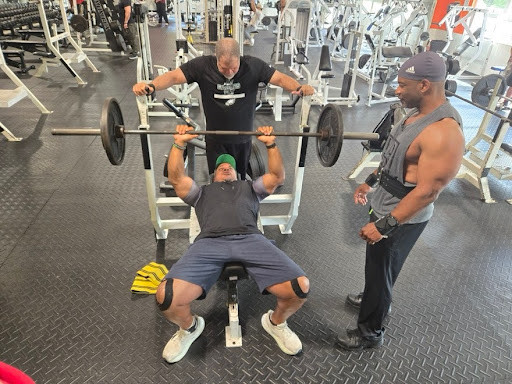The Power of Discipline: How Stanley Nicholson Turned a Health Crisis into a Mission for Mind, Body, and Soul

For most of his life, Stanley Nicholson's identity was built on the physical. As a young man, he trained hard for football, playing linebacker through his college years. After graduation, he transitioned into bodybuilding, spurred on by a chance meeting with a former professional who recognized his potential. By the late '90s, Nicholson was fully immersed in the world of weight training, nutrition, and the pursuit of physical perfection. But in April 2022, everything stopped.
"I was at the gym on a typical day, training with a buddy, who happened to be a neurologist that I've worked out with for 20 years," Nicholson recalls. "Next thing I know, I woke up in the hospital." He had suffered two seizures that day, one on the gym floor, another in the ambulance. Tests revealed a benign meningioma on his frontal lobe. His neurosurgeon, a fellow powerlifter, gave him two options: lifelong medication or surgery. Nicholson chose the operation.
The surgery was successful, but the recovery was brutal. "I couldn't work out, couldn't work, I couldn't do anything. For someone who's been active since I was 14, it felt like a death sentence," he says. Months of inactivity led to weight gain and a loss of identity. "One day I looked in the mirror and didn't recognize the guy staring back at me," he shares.
It was a turning point. Stripped of his usual outlet, Nicholson turned inward. He immersed himself in books on spirituality and self-development, exploring a part of himself he admits he had neglected. "I realized I had been feeding my physical self but starving my soul," he says. "Maybe that's why the universe tripped me up, to make me recalibrate."

That recalibration reshaped his philosophy on health. Today, Nicholson doesn't just work out his body; he trains his mind and spirit with the same discipline. His mornings begin with a consistent ritual: breathing exercises, meditation, and journaling. The gym remains an anchor, but he calls his morning routine 'the more substantial anchor' because it quiets the mind before building the body.
Nutrition also transformed. Processed foods are gone. Protein from fish, chicken, and eggs anchors his diet, while fruits like watermelon and pineapple satisfy sweet cravings. He avoids rigid 'diet' labels, instead calling it "healthy living, my way of living."
His shift in priorities has sparked a new project that is currently under development: Wolfpack Wellness, a group-based program designed as both an online forum and an in-person gathering space where people can share their wellness journeys, victories, and setbacks. Inspired by the animal's ability to thrive both alone and in a pack, Nicholson envisions it as a safe space, online and in person, for people to share honest wellness journeys, not just highlight reels.
"Wolves push each other forward aggressively. That's the mentality," he explains. The program will cover physical and mental health, with resources for fitness, nutrition, and keeping the mind active, what Nicholson calls 'distilling life to its simplest form.'
At the core of Nicholson's message is simplicity and gratitude. "Vitamin G, gratitude, is something I take daily," he says. "If you can breathe, move, and get up in the morning, that's a gift that you have received."
Now in his 50s, Nicholson rejects the notion that age defines ability. "You don't have to accept what you've been told is 'normal' for your age," he insists. "Get outside, move your body, unplug from the noise. Narrow life down to what matters. That's where joy is."
From football fields and bodybuilding stages to hospital recovery rooms, Nicholson's path has been anything but linear. But his current direction, rooted in discipline, simplicity, and service, is clear. "Whether it's my mind, body, or soul, I'm going to practice that one kick a thousand times," he says. "And I'm going to help others do the same."
© Copyright IBTimes 2025. All rights reserved.





















